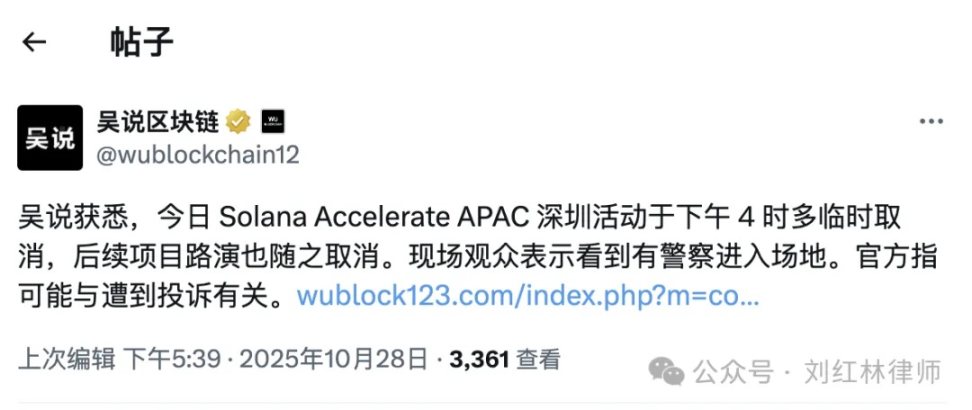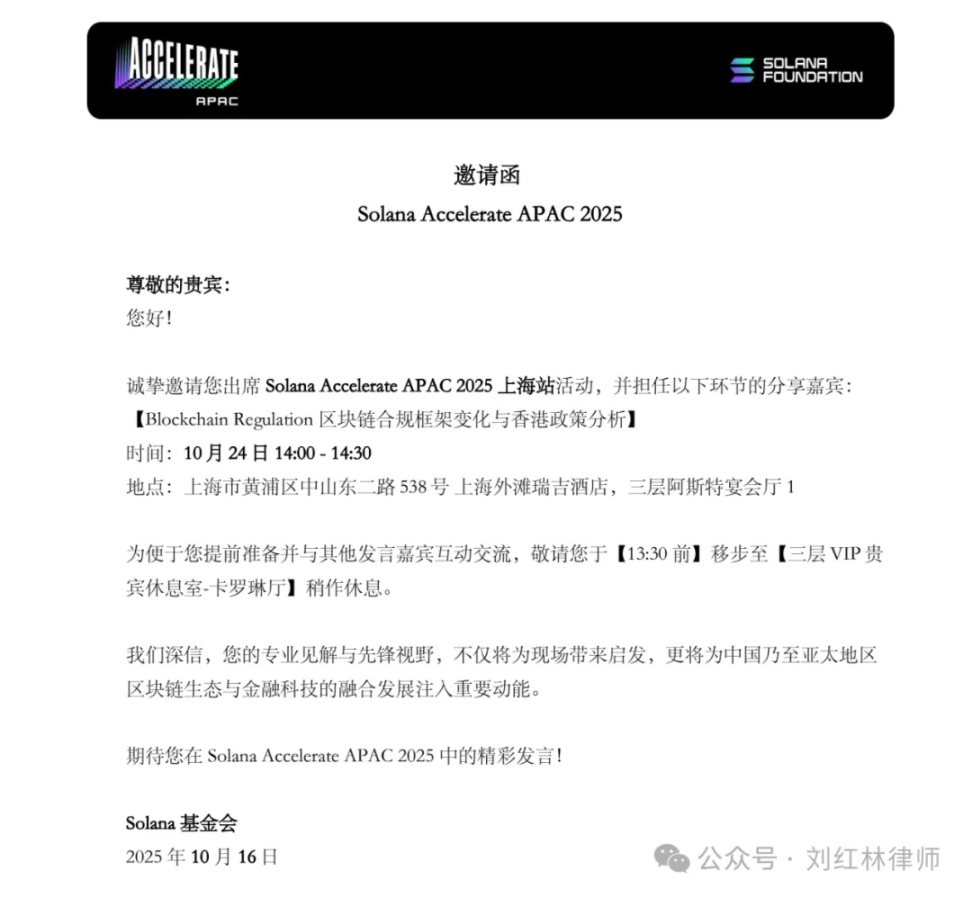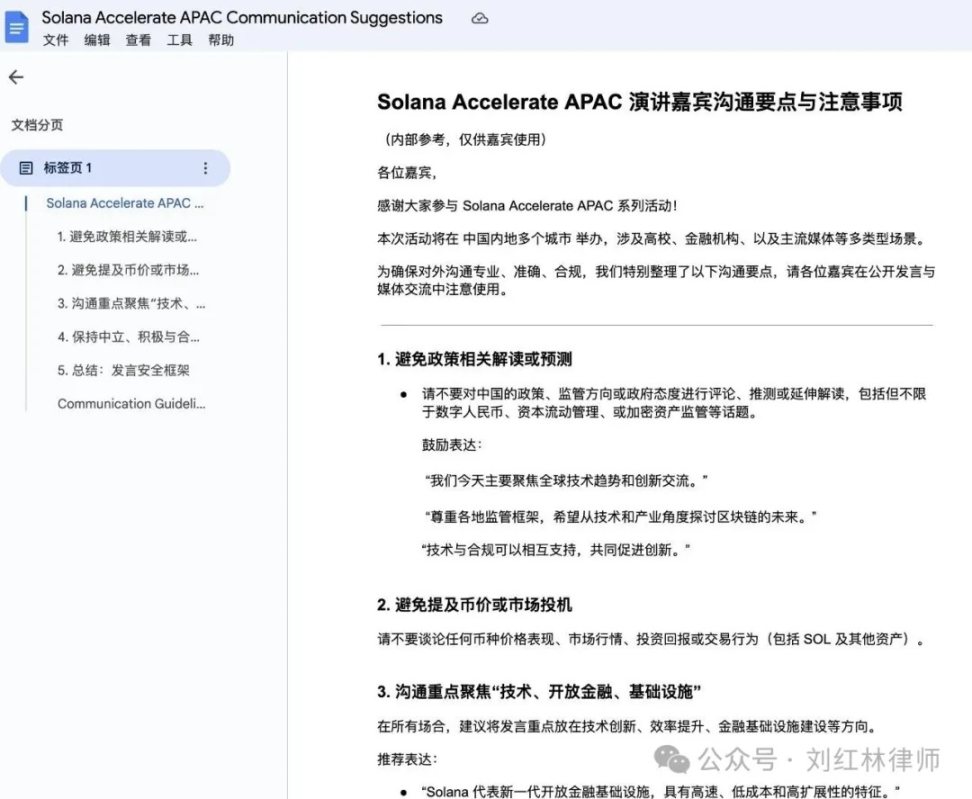Wu reported that the Solana Accelerate APAC Shenzhen event was temporarily ended early due to police intervention, and the subsequent project roadshow was stopped. Lily, chairman of the Solana Foundation, was also present at the event.
The news immediately sent shockwaves through the community—WeChat groups and social media were abuzz with discussions: Is Web3 activity banned in mainland China? Has the regulatory stance changed again? "If even Solana isn't allowed, who would dare to do it?"

In my opinion, these voices are more emotional reactions. The reality is actually simpler and more nuanced than rumors suggest. This isn't a sign of tightening regulations in mainland China, but more likely a fluke.
Coincidentally, just last Friday, Honglin was invited to participate in a roundtable discussion at a similar Solana event in Shanghai. As a result, I'm familiar with some of the details surrounding Solana's offline events. I felt it necessary to share this article with you on how similar offline blockchain events can be held in mainland China to ensure greater security and compliance.

I was very impressed with Solana's conference organization. The team was very professional. The foundation team communicated with all guests several days in advance about speaking guidelines, a meticulous approach that is exemplary in the industry. They clearly mandated no discussion of price, no regulatory predictions, no comparisons of Chinese and international policies, and focused solely on topics such as technology, ecosystem, infrastructure, and open finance.
They even prepared bilingual "security presentation" templates in Chinese and English, with messages like "Today, we will focus on global technology trends and innovation exchanges," "We respect local regulatory frameworks and hope to explore the future of blockchain from both a technical and industry perspective," and "Technology and compliance can support each other and jointly promote innovation." This clearly shows that the Solana team's understanding of the Chinese context and risk awareness are far above the industry average. This is one of the most thorough compliance management events I've ever attended.

According to attorney Honglin's understanding of the industry, the Shenzhen event's clearance was likely the result of a malicious report stemming from an investment dispute involving a guest or user participating in the project, prompting police intervention. Law enforcement agencies, upon receiving a report, do not distinguish between "Web3 conferences" and "conferences"—as long as there's evidence of suspected illegal activity, police must be dispatched. In other words, this isn't a warning that "Web3 events can't be held in mainland China," but rather a reminder that while some things can be done, it requires greater understanding of how to proceed.
From the perspective of an industry legal compliance practitioner, Honglin believes that Solana's offline event and speaker communication methods and compliance documents are worth learning for every event organizer in the industry. It clearly explains the five key boundaries of event communication and also summarizes how to conduct Web3 exchanges legally and healthily in China.
First, avoid policy interpretation and regulatory forecasting
Any statement regarding "regulatory trends" or "policy signals," even well-intentioned speculation, will be amplified by the media as a "statement of opinion." In public on the mainland, the safest approach is to respect regulators and not speak on their behalf. You can discuss global trends and technological practices, but avoid "justifying" policies.
Second, it does not affect the price of the currency and the return on investment
Any mention of coin prices, market trends, or ROI—whether through case studies, jokes, or metaphors—can be misinterpreted as coin recommendations or investment guidance. Price isn't the sole indicator of industry value; focusing on technology and applications is the safest strategy.
Third, focus on technology, ecology and infrastructure
These are the safest and most substantive topics in the Chinese context. Talking about TPS, development efficiency, and global collaboration not only complies with regulations but also demonstrates professionalism. Solana's emphasis on "open financial infrastructure" at the event is a perfect example of positioning itself.
Fourth, maintain a neutral and cooperative attitude
Avoid comparing countries, avoid using the phrase "China vs. other countries," and don't use Hong Kong as an example to imply that mainland China is lagging behind. The correct approach is: regulatory paces vary across regions, but the goal is to allow innovation to grow within a manageable framework.
Fifth, prepare filing and emergency response mechanisms in advance
This point is often overlooked. In fact, reporting the event to the venue, park, or street office beforehand is a very effective risk prevention line. Of course, it would be even more appropriate if the event could be jointly organized with relevant government departments and industry associations. In the event of complaints or misunderstandings, having the record in hand allows for immediate clarification of the nature of the event. At the same time, guests should sign a statement of compliance, explicitly prohibiting coin promotion, marketing, and investment inducement. Finally, prepare an emergency statement template so that if law enforcement or public opinion arises on-site, a timely response can be provided to avoid further misunderstandings.
These measures may seem cumbersome, but they are actually bottom-line thinking.
From a broader perspective, China's policy stance on blockchain has been clear: supporting technological innovation while opposing financial speculation; supporting the digital economy while opposing token financing. The policy boundaries are stable and clear.
The so-called "sudden shift in the wind" is largely a misinterpretation. Over the past few years, the national government has continuously encouraged the innovation and implementation of blockchain technology, whether in blockchain-based supply chain finance, digital asset ownership confirmation, cross-border data governance, or judicial evidence storage.
Just yesterday, Lawyer Honglin participated in the blockchain special application selection work of a district government in Shanghai as an evaluation expert. The Shanghai government is encouraging blockchain startup teams that really do things with real money.
In other words, the real forbidden zone isn't blockchain, but rather the "financialization of tokens" and "fraudulent activities under the guise of blockchain." Understanding the fine line between technological incentives and financial constraints is fundamental to developing Web3 in China.
Looking back at the industry history over the years, from the "Blockchain Conference was stopped" in Beijing in 2018, to the "Metaverse Salon was summoned" in a certain place in 2021, to the Solana Shenzhen incident, each "clearance" was not a blow to innovation, but telling everyone: Industry exchange activities can be carried out, but they require more meticulous wisdom.








